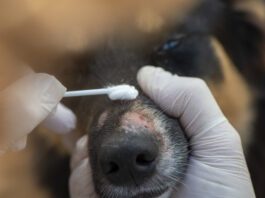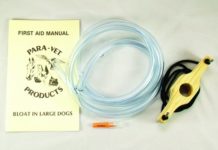Advocate for Your Dog
Willow. She scans for hazards (snakes
Vitamin D for Dogs
Vitamin D deficiencies in dogs can cause health problems over time, but so can an oversupply. Because vitamin D is fat soluble, it accumulates in body fat. Overdoses can be toxic and even fatal, but some vitamin D is necessary to a dog's health. Vitamin D will aid in the absorption of calcium and phosphate, increases bone cell activity, influences the formation and growth of long bones, and speeds the healing of fractures. Adequate D levels may help prevent heart disease, joint inflammation, skin and coat problems, cancer, vision problems, depression, mental illness, infections, inflammatory bowel disease, dental problems, hyperparathyroidism, and kidney disease.
29 Dog Breeds Predisposed to Hypothyroidism
These 29 dog breeds are the top most inclined to develop hypothyroidism as they age.
Bloating in Dogs Treatable with Gastropexy
Symptoms of bloat, which is incredibly painful for the dog, include pacing and restlessness; a distended abdomen; turning to look at or bite at the flank area; rapid, shallow breathing; retching without actually vomiting up any food, and excessive drooling. Bloat is a two-part disorder, telegraphed by its formal name: gastric dilatation and volvulus. The first part, gastric dilatation, refers to an expansion of the stomach due to the presence of gas and/or food. The second part, volvulus, is the fatal blow: The distended stomach begins to twist, cutting off the blood supply and causing its tissue to die off.
Cayenne for Canines: They’re Not Too Hot!
Since 1985, the International Herb Association has announced its Herb of the Year during National Herb Week, which this year is May 1 through 7. The IHA has just published Capsicum: Herb of the Year 2016, a book that reviews chili peppers and their growing conditions and uses, and the organization helps garden centers and herb farms promote its featured plant.
Help Heal Your Dog with Common Herbs
All I could hear was the buzz of a thousand bees as I parted my way through a deep thicket of Heracleum lanatum, a tall, broad-leaved member of the parsley family commonly known as cow parsnip." The big
Blood Pressure Tests for Dogs: Worth It?
A health exam for all adults includes a blood-pressure reading. So why not for our dogs? There are a few reasons that veterinarians save blood-pressure testing for only certain cases. Although an estimated 20 percent of humans suffer from white-coat syndrome" (temporary high blood pressure caused by the anxiety associated with visiting the doctor)
Canine Parvovirus Myths and Truths
MYTH: Adult dogs don't get parvo. TRUTH: It's true that the likelihood of a serious parvo infection decreases as dogs age, and that most victims are puppies. But adult dogs can become seriously ill or die from parvo. MYTH: I can protect my dogs from exposure to parvo by maintaining a clean environment and restricting their contact with other dogs.
Parvo Victim # 1
Three days after Jonah first showed symptoms, so did his brother, Micah. Three days later, eight-year-old Tyrone and two-year-old Vivian, both Malamutes, became ill. Levy caught their symptoms early because she kept all of her dogs confined and followed them individually to check for diarrhea. Parvo's diarrhea has such a specific
Parvo Victim # 2
The name Ray Carlisle is synonymous with Doberman Pinschers. A breeder and exhibitor for 40 years, a show judge for the last 20 years, and a former president of the Doberman Pinscher Club of America, the United Doberman Club, and the American Working Dog Federation, the New York resident travels the world on behalf of his favorite breed. I vaccinated my dogs for many years
Collecting Dog Poop for Science
I was at the gym recently, swimming laps. After my workout, I was sitting by the side of the pool and a fellow swimmer and friend stopped to chat about dogs. He has never owned a dog, but his daughter has been pressuring him and he thinks she is finally old enough to take on the responsibility of caring for a dog (good dad!). So, I was anticipating a discussion about breeds, where to look, training, feeding, etc. But that is not where this was going at all. Instead, he wanted to talk about poop.
Canine Atopic Dermatitis
In late autumn, we closed our pool, an annual event that all four of our swim-loving dogs dread. They will swim as long into the fall season as we allow and I am pretty certain that our Toller, Chippy, would bring out an ice pick and break his way through the ice if he could. In addition to the daily joy, excitement, and happiness that our pool brings to us all, we have found that it has had an additional benefit for some of our dogs. The pool and the daily swims that it provides help to keep itchy dogs from itching all summer long.
















